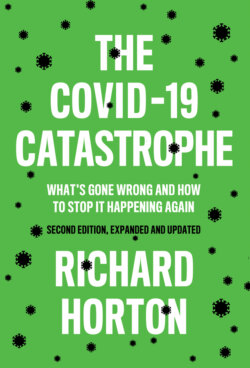Читать книгу The COVID-19 Catastrophe - Richard Horton - Страница 8
Preface
ОглавлениеCOVID-19 is a pandemic of paradoxes.
Most of those who became infected with this new coronavirus suffered only mild disease, perhaps not easily shaken off, yet shaken off nevertheless. But a substantial number – perhaps as many as one in five – developed a much more severe illness, often requiring intensive care and mechanical ventilation. For far too many, COVID-19 meant that death was their destiny.
Being older and poorer and living with chronic disease were important risks for worse outcomes. Yet a significant proportion of those who endured severe illness were also young and previously fit and well.
The scientific community made an astonishing contribution to producing the new knowledge needed to guide a response to COVID-19. But many questions about the virus and the disease it causes remain unanswered, leaving important gaps in our understanding of the pandemic that make its control, even with the availability of several safe and effective vaccines, exceptionally difficult.
The World Health Organization (WHO) acted with unprecedented velocity to declare a Public Health Emergency of International Concern (PHEIC). But the world’s only global health agency also struggled under intolerable political pressures to retain its credibility.
Countries pledged their support to international cooperation to defeat the pandemic. Yet those same countries were embarrassingly slow to match words with deeds, and too often they resorted to rivalry and blame.
This was a pandemic that was described and reported in terms of statistics – numbers of infections, numbers of patients in critical care and numbers of deaths. Lives were transformed into mathematical summaries. Graphs of the epidemic were drawn. And countries were compared for their rates of mortality.
But those who died cannot and should not be summarised. They must not become lines on squared paper. They must not become mere rates used to argue differences between nations. Every death counts. A person who died in Wuhan is as important as one who died in New York. Our way of describing the impact of the pandemic erased the biographies of the dead. The science and politics of COVID-19 became exercises in radical dehumanisation.
At press conference after press conference, government ministers and their medical and scientific advisors described the deaths of their neighbours as ‘unfortunate’. But these were not unfortunate deaths. They were not unlucky, inappropriate or even regrettable. Every death was evidence of systematic government misconduct – reckless acts of omission that constituted breaches in the duties of public office.
I edit a medical journal, The Lancet, which found itself a conduit between medical scientists urgently trying to understand COVID-19 and politicians, policymakers and the public who somehow had to respond to the pandemic. As we read and published the work of these remarkable frontline workers, I was struck by the gap between the accumulating evidence of scientists and the practice of governments. As this space grew larger, I became angry. Missed opportunities and appalling misjudgements were leading to the avoidable deaths of tens of thousands of citizens. Those misjudgements were repeated during successive waves of the pandemic. There has to be a reckoning.
This book is their story.
